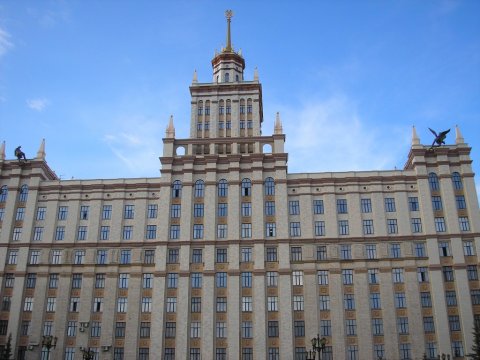An adaptive measuring regulator was developed at SUSU capable to dynamically control technological processes at enterprises of various industrial sectors.
.png)
The market of automatic process control systems for enterprises, as well as of “smart home” systems is very big in Russia and is constantly developing and improving. The future trends already visible in the prospects of the sector development demonstrate the striving to produce more science-intensive and energy-efficient systems allowing for a deeper process automation.
Director of Scientific and Production Center “Industrial Automation” Alexei Uskov shares what an adaptive measuring regulator is, what its applications are, as well as its competitive advantages as compared to the existing regulating systems.
– What is an adaptive measuring regulator?
− It is a functionally complete device, which is used in automatic process control systems. At any enterprise of various industrial sectors there is a technological process which needs to be controlled based on measurement data received from sensors. In this case our adaptive measuring regulator is intended for receiving information from sensors, analyzing the received information, making forecasts on changes in the controlled process parameter based on the gained experience (self-learning), and of course, elaborating of the controlling action. Now we have produced 5 prototype models, which we use to perform tests.
– What fields may this development be applied to?
− In general measuring regulators are widely used in automatic process control systems for enterprises of all industrial sectors. The task of measuring regulators includes measuring the values of process parameters (for instance, temperature, pressure, level) elaborating of the controlling actions in order to maintain the values of the controlled parameters within the prescribed limits. Most intensively measuring regulators are used in metallurgical, oil-and-gas, and chemical industries, as well as in the housing and utilities sector to control heat supply systems of residential buildings. The issue of efficient regulation is a very topical one, since if you think financially about the metrological component of this issue, then even an insignificant improvement of energy efficiency of technological processes at industrial enterprises leads to colossal saving in a company’s financial assets during one year.
– How did you improve your measuring regulator?
− At present measuring regulators are widely spread which do the regulation following the so-called proportional-integral-derivative law (PID-law). It means that a PID controller elaborates the controlling action for the changes in the process parameters that have already occurred. We set ourselves the goal of coming up with such a measuring regulator which would really be an adaptive one. It would have to elaborate the controlling action not for the already occurred changes, but to forecast possible changes of the controlled process parameters and elaborate a preventing action, what would eventually allow to improve energy efficiency.
– What competitive advantages does this innovation offer?
− First of all, its advantage is a 30-35% improvement of energy efficiency of an enterprise’s technological process as a result of self-learning of the adaptive measuring regulators due to constantly decreasing re-adjustment ratio. Secondly, in automatic individual adaptation of the control system to a certain technological process of an enterprise due to using settings algorithms based on neural networks and fuzzy logic. Thirdly, in reducing the degree of an operator’s influence on an enterprise’s technological process. Fourthly, in the in-built self-diagnostics systems allowing to perform maintenance and repair of equipment “as applicable”, and not “as scheduled”.
– Is a technological process possible without a regulator?
− Before, when automatic process control systems did not exist at enterprises, and the processes themselves were nothing but simplest sequences of interconnected actions, the parameters were controlled by operators manually.
But today technological processes at enterprises change considerably. In particular, the number of parameters controlled simultaneously has increased sharply, and the required time of response to the occurring changes has reduced. In this context the price of a mistake is many times higher. That is exactly why modern enterprises are actively implementing smart automatic process control systems, while improving energy efficiency of control, and therefore its financial efficiency.
This innovation will be presented at the exhibition “SUSU Science and Innovations” on the occasion of the Russian Science Day. The exhibition will open at the SUSU Exhibition Center “Science and Technologies of South Ural” (Room 018 of the Main University Building) on February 8 that 11:00.




